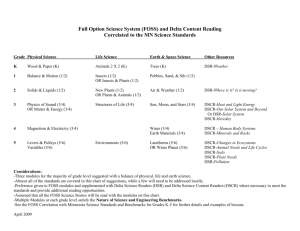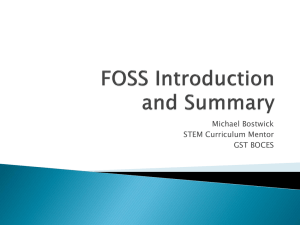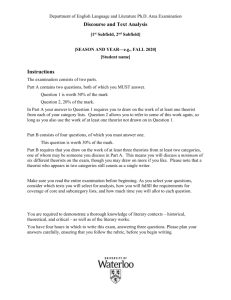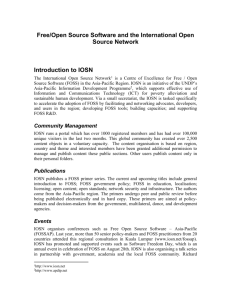colloquium in communication: feminist rhetorical theory
advertisement
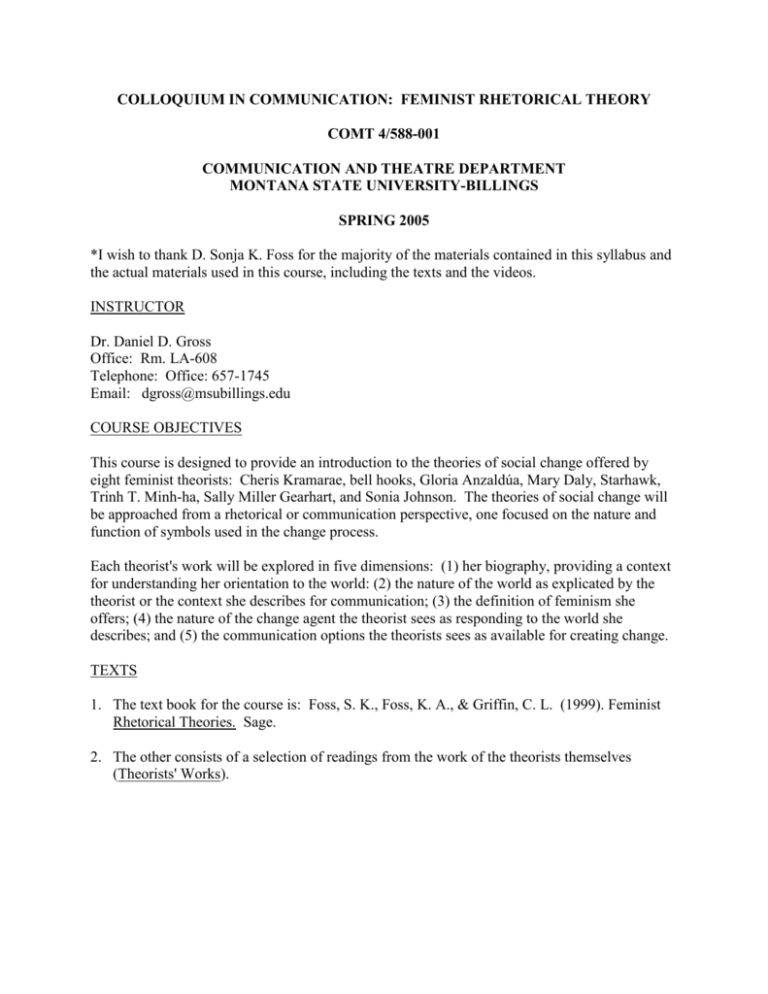
COLLOQUIUM IN COMMUNICATION: FEMINIST RHETORICAL THEORY COMT 4/588-001 COMMUNICATION AND THEATRE DEPARTMENT MONTANA STATE UNIVERSITY-BILLINGS SPRING 2005 *I wish to thank D. Sonja K. Foss for the majority of the materials contained in this syllabus and the actual materials used in this course, including the texts and the videos. INSTRUCTOR Dr. Daniel D. Gross Office: Rm. LA-608 Telephone: Office: 657-1745 Email: dgross@msubillings.edu COURSE OBJECTIVES This course is designed to provide an introduction to the theories of social change offered by eight feminist theorists: Cheris Kramarae, bell hooks, Gloria Anzaldúa, Mary Daly, Starhawk, Trinh T. Minh-ha, Sally Miller Gearhart, and Sonia Johnson. The theories of social change will be approached from a rhetorical or communication perspective, one focused on the nature and function of symbols used in the change process. Each theorist's work will be explored in five dimensions: (1) her biography, providing a context for understanding her orientation to the world: (2) the nature of the world as explicated by the theorist or the context she describes for communication; (3) the definition of feminism she offers; (4) the nature of the change agent the theorist sees as responding to the world she describes; and (5) the communication options the theorists sees as available for creating change. TEXTS 1. The text book for the course is: Foss, S. K., Foss, K. A., & Griffin, C. L. (1999). Feminist Rhetorical Theories. Sage. 2. The other consists of a selection of readings from the work of the theorists themselves (Theorists' Works). Required Activities and Grading 1. Questions for Class Discussion: Bring to class for each of the eight theorists discussed in class a question (written, but not necessarily typed) that you would like to contribute to class discussion. Theses questions should be concerned with "how" and "why" more so than with "what" issues. In other words, the question should not simple involve summarizing a theorist’s ideas. In class discussion is worth 20% of the final grade. 2. Think Pieces: A reflection (approximately 3 pages, typed, double spaced) on four of the theorists covered in class (you may choose which four to cover). These think pieces should not be chapter or article abstracts, summaries of readings, or expressive essays. They should be written to incorporate the three dimensions of: (a) your intellectual interests; (b) your lived experiences (the engagements with the world that form and sustain you); and (c) the reading by and about the theorist. Each Think piece is worth 20% of the final grade each. They will be graded as follows: (a) Insights: Extension, application, building on the theorist's ideas, taking her ideas somewhere. (20 points); (b) Clear thesis: One clear major idea is the focus of the paper and is the point of all of the ideas discussed (10 points): (c) Integration of readings: at least one idea by the theorist is used to develop ideas in the paper, with reference to the sources of the idea (5 points); and (d) Form: Grammar, punctuation, proofreading, and other aspects of form are appropriate (5 points). Finally, a peer in the class will grade two of the think pieces. The instructor will grade the other two. All grades will be averaged. POLICIES 1. Attendance is expected. Attendance will be used to determine final grades in borderline cases. 2. I would appreciate your efforts to use sex-neutral language in your speaking and writing. Since the language we speak and write leads us to perceive in certain ways, sex-neutral language will help all of us perceive women and men on equal terms, participating equally in the world. For example, use "he or she" instead of "he" when the person to whom you are referring could be of either sex. Similarly, use "people" or instead of "man" or "mankind." COURSE SCHEDULE (weekly) Week 1 Introduction to the course and one another Overview of Feminist perspectives on rhetoric Reading: Foss, Chapters 1 and 2 Week 2 Chris Kramarae: Reading: Foss, Chapter 3 “Readings” Video Week 3 Kramarae Continued Week 4 bell hooks: Reading: Foss, Chapter 4 “Readings” Video Week 5 Gloria Anzaldúa: Reading: Foss, Chapter 5 “Readings” No Video Week 6 Mary Daly: Reading: Foss, Chapter 6 “Readings” Video Week 7 Starhawk: Reading: Foss, Chapter 7 “Readings” No Video Think Piece #1 Due Week 8 Paula Gunn Allen: Reading: Foss, Chapter 8 “Readings” No Video Week 9 Trinh T. Minh-ha: Reading: Foss, Chapter 9 “Readings” No Video Week 10 Sally Miller Gearhart: Reading: Foss, Chapter 10 “Readings” Video Think Piece #2 Due Week 11 Sally Miller Gearhart Continued Week 12 Sonia Johnson: Reading: Foss, Chapter 3 “Readings” Video Week 13 Sonia Johnson Continued Week 14 Think Piece #3 Due Week 15 Unfinished Business Think Piece #4 Due Week 16 Unfinished Business
